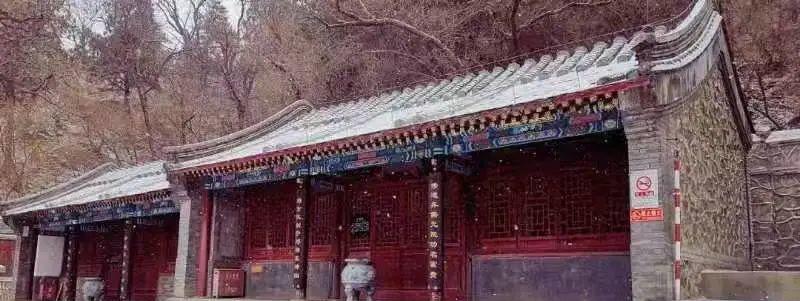There is a saying in old Beijing: "The ghost king in front of the mountain, the demon king behind the mountain." Among them, the "Devil King" refers to the Charity Temple, also known as the Tiantai Temple in the Beiping Travel Guide, located on mount Tiantai in Shijingshan District, Beijing.

About this temple, there are some important labels: mad monk, Shunzhi, Demon Lord, and Burning Lamp Ancient Buddha. The origin of these labels is because of the many legends about the charity temple circulated in the Qing Dynasty. There are mainly "Shunzhi Renunciation TiantaiShan", "Tiantai Mountain Monk", "Shunzhi and Guishan Poems", "Shunzhi and Li Yinyang Fighting Method" and so on.
In these legends, they are all related to Shunzhi, yes, it is said that this is the place where the Shunzhi Emperor became a monk, trained hard to become a Buddha, and was later given the Demon King monk, Kangxi has come to Tiantai Mountain many times to worship, and also sent a plaque and a golden veil.
This legendary place has attracted many people, including outstanding patriots, famous military experts and politicians, strong democracy fighters, and a sincere friend of the Chinese Communist Party, General Feng Yuxiang. From 1912 to 1924, he went to Tiantai Mountain three times and left precious footprints on Tiantai Mountain.
Feng Yuxiang first went to Tiantai Mountain in May 1912, when he was ordered to guard the Ordnance Bureau of the War Department at three stores in western Beijing, northeast of which was Tiantai Mountain.
The second time he came to Tiantai Mountain was in March 1917, when General Feng Yuxiang, dissatisfied with Duan Qirui's rule, came here to "recuperate" and live in the East Cross Courtyard Room. The courtyard is quiet and elegant, with a locust tree and two begonia trees and several beautifully carved small stone Buddhas.
During this period, he wrote many couplets, such as: "When the wind and waves are calm in the ninja film, take a step back from the sea and the sky" "Fame is mostly on the day of hard work, and when the failure is mostly due to pride."
The third time he came to live in seclusion was in October 1924, when General Feng was ostracized by Duan Qirui and Zhang Zuolin. During the time he lived in the Charity Temple, General Feng got along very well with the monks of the Charity Temple. In his spare time, he also wrote 4 couplets - "If you want to get rid of your troubles, you must be a good person without yourself, go through hardships and be a good person", "No slackness, no absurdity, no punishment, no hesitation, no joy and humility", "Righteousness and fellow colleagues have no separation, and it is advisable to practice hardships and hardships", "Poor scriptures have a rest day, and the learner of the Tao is the ultimate person".
Feng Yuxiang and the Monk of Yuzong had a very tacit understanding and often chatted. Once, Feng Yuxiang asked the monk Yuzong: "When I came to play, there was only one big temple, but this time, I saw that several small temples were newly built, one of which was the Temple of the Lady of the Mother, why did you build these temples?" The monk Yuzong said, "Because the common people come to the mountain to incense, many of them are for the sake of asking for children, if they do not build this temple, they will not come to incense." After listening, Feng Yuxiang humorously praised the monk: "You are really capable, you are a monk like opening a shop, what goods customers need, you will do what goods." ”
In October 2005, in order to commemorate General Feng Yuxiang, the Charity Temple opened a special "General Feng Yuxiang Showroom". In the courtyard of the exhibition room, you can see two leafy chinese locust trees, these two trees are called "husband and wife trees", which were planted jointly by General Feng Yuxiang and his second wife, Ms. Li Dequan, when they lived here.
The four seasons of the temple are elegant, far from the hustle and bustle of the city, with a thick history and mysterious legends. Coming here, you can feel the state of mind of Shunzhi's monks here, and the deep meaning of General Feng's seclusion here.
Shooting units
Propaganda Department of the SHIJINGSHAN DISTRICT COMMITTEE OF THE CPC Beijing Municipality
Beijing Radio and Television Station
Source: Three cultural belts
Editor: Shijingshan Rong Media Center Shi Dali